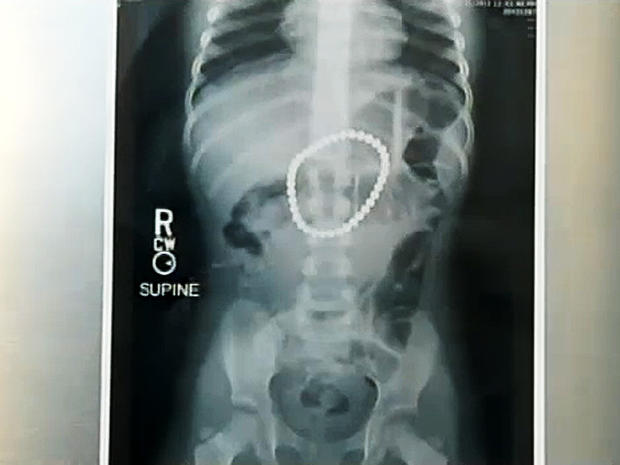Gov't complaint halts Buckyballs sales, citing injury risks
(CBS News) Buckyballs may soon be hard to come by, now that the federal government has filed a complaint to stop the magnets' sales over injury risks.
In a complaint filed by the U.S. Consumer Product Safety Commission (CPSC), the government consumer protection watchdog announced its action to "protect the public from the substantial risks of injury presented by aggregated masses of high-powered, small rare earth magnets known as Buckyballs and Buckycubes." The small magnetic balls are made by New York-based Maxfield and Oberton.
3-year-old swallows 37 Buckyball magnets, survives
CPSC spokesman Scott Wolfson told USA Today that major retailers including Amazon, Brookstone and Urban Outfitters, have agreed to stop selling these and similar products because of the risks posed to children who swallow the tiny balls.
The agency estimates more than 2,000,000 Buckyballs have been sold in the U.S. in addition to 200,000 Buckycubes.
In the complaint, the CPSC said the products - which come in containers containing from 10 to 216 small magnets - might cause major health risks if swallowed. Children under 14 may place the magnets in their mouth or adolescents and teens might use them to mimic cheek or tongue piercings, accidentally swallowing them.
If two or more magnets are swallowed, the group said in the complaint, the magenetic forces could pinch or trap the intestinal walls causing long-term health consequences, including the potential for inflammation, ulceration or perforation of the intestines. These conditions can lead to infection, sepsis - a dangerous bodily response to bacteria in the body - or even death.
What's more, symptoms from swallowing the magnets may appear flu-like, including nausea, vomiting and abdominal pain. Caretakers, parents and doctors might think there's a gastrointestinal issue, delaying potentially life-saving treatment.
Even if discovered, the CPSC said treatment can be risky because the magnets may attach to an endoscope or surgical tool during removal. Long-term, children who've had magnets removed may experience scarring, nutritional deficiencies or fertility issues in women.
In March of this year, 3-year-old Payton Bushnell of Portland, Ore., was hospitalized after swallowing 37 Buckyballs. The balls snapped Payton's intestines together and ripped holes through her stomach and lower intestine, requiring surgery.
"This underscores the fact that Buckyballs and Buckycubes are for adults and are not toys for children," Buckyballs said in a statement at the time.
The CPSC said in the complaint that the products were initially advertised and marketed to children as an "amazing magnetic toy" when they hit the U.S. market in March, 2009. Eventually the magnets were rebranded as an adult desk toy and stress reliever "despite making no significant design or physical changes to the product," according to the CPSC.
It says the labeling and warning labels can't guard against the misuses of the product to prevent the substantial injury risk to children.
CPSC spokesperson Alex Filip told HealthPop that there was one report of swallowing these magnets in 2009, then seven in 2010, and by October, 2011 there were already 14, a pattern that was "increasing dramatically," he said.
The agency then worked with Maxfield and Oberton on the issue but despite those efforts, there were more reports of ingesting the metals, which is when the CPSC took action, he said.
"We worked with the commission in order to do an education video less than 9 months ago, so we are shocked they are taking this action," Maxfield and Oberton founder Craig Zucker said in a statement, according to the Associated Press, calling the agencies actions "unjust and un-American" and adding it would fight the agency.
In 2011, the CPSC launched a video on YouTube warning children of the potential dangers:
The CPSC has more on risks from swallowing magnets.
